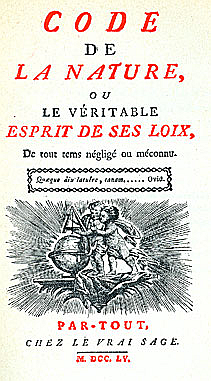|
Étienne-Gabriel Morelly
Étienne-Gabriel Morelly (; 1717–1778) was a French utopian thinker, philosopher and novelist. An otherwise "obscure tax official",Michael Sonenscher, ''Sans-Culottes: An Eighteenth-Century Emblem in the French Revolution'', Princeton University Press, 2008, p.229 and teacher, Morelly wrote two books on education, a critique of Montesquieu and ''The Code of Nature,'' which was published anonymously in France in 1755.De Boni, C. (2012). Nature and Utopia in Morelly's Code De La Nature. In M.A. Ramiro Avilés & J.C. Davis (Eds.). Utopian Moments: Reading Utopian Texts (Textual Moments in the History of Political Thought, pp. 74–79). London: Bloomsbury Academic. Retrieved April 12, 2022, from http://dx.doi.org/10.5040/9781849666848.ch-012 This book, initially attributed to philosophes including Rousseau and Diderot, criticised contemporary society, postulated a social order without avarice, and proposed a constitution intended to lead to an egalitarian society without property, ... [...More Info...] [...Related Items...] OR: [Wikipedia] [Google] [Baidu] |
18th-century Philosophy
This is a timeline of the 18th century in philosophy. Events *Age of Enlightenment, The Age of Enlightenment *1700 - Gokulanatha Upadhyaya was made court pandit to Maharaja Madhave Sinha of Mithila (region), Mithila. *1743 - The American Philosophical Society (APS) was founded. Publications *1700 - ''Historia religionis veterum Persarum,'' Thomas Hyde. *1700 - ''De Origine Juris Romani,'' Giovanni Vincenzo Gravina. *1702 - ''The Lives of the Ancient Philosophers''. *1704 - ''Moderation Truly Stated'', Mary Astell''.'' *1725 - ''The New Science'', Giambattista Vico. *1739-1740, 40 - ''A Treatise of Human Nature,'' David Hume. *1748 - ''An Enquiry Concerning Human Understanding,'' David Hume. *1748 - ''The Spirit of the Laws,'' Montesquieu. *1748 - ''Man a Machine'', Julien Offray de La Mettrie. *1751 - ''An Enquiry Concerning the Principles of Morals,'' David Hume. *1756 - ''A Vindication of Natural Society'', Edmund Burke. *1759 - The Theory of Moral Sentiments, ''The Theory o ... [...More Info...] [...Related Items...] OR: [Wikipedia] [Google] [Baidu] |
Charles Fourier
François Marie Charles Fourier (; ; 7 April 1772 – 10 October 1837) was a French philosopher, an influential early socialist thinker, and one of the founders of utopian socialism. Some of his views, held to be radical in his lifetime, have become mainstream in modern society. For instance, Fourier is credited with having originated the word ''feminism'' in 1837. Fourier's social views and proposals inspired a whole movement of intentional communities. Among them in the United States were the community of Utopia, Ohio; La Reunion near present-day Dallas, Texas; Lake Zurich, Illinois; the North American Phalanx in Red Bank, New Jersey; Brook Farm in West Roxbury, Massachusetts; the Community Place and Sodus Bay Phalanx in New York State; Silkville, Kansas, and several others. In Guise, France, he influenced the . Fourier later inspired a diverse array of revolutionary thinkers and writers. Life Fourier was born in Besançon, France, on 7 April 1772. Serenyi 1967, p. ... [...More Info...] [...Related Items...] OR: [Wikipedia] [Google] [Baidu] |
Authors Of Utopian Literature
In legal discourse, an author is the creator of an original work that has been published, whether that work exists in written, graphic, visual, or recorded form. The act of creating such a work is referred to as authorship. Therefore, a sculptor, painter, or composer is considered the author of their respective sculptures, paintings, or musical compositions. Although in common usage, the term "author" is often associated specifically with the writer of a book, Article (publishing), article, Play (theatre), play, or other written work. In cases involving a work for hire, the employer or commissioning party is legally considered the author of the work, even if it was created by someone else. Typically, the first owner of a copyright is the creator of the copyrighted work, i.e., the author. If more than one person created the work, then joint authorship has taken place. Copyright laws differ around the world. The United States Copyright Office, for example, defines copyright as "a ... [...More Info...] [...Related Items...] OR: [Wikipedia] [Google] [Baidu] |
Proto-socialists
Utopian socialism is the term often used to describe the first current of modern socialism and socialist thought as exemplified by the work of Henri de Saint-Simon, Charles Fourier, Étienne Cabet, and Robert Owen. Utopian socialism is often described as the presentation of visions and outlines for imaginary or futuristic ideal and socialist societies that pursue ideals of positive inter-personal relationships separate from capitalist mechanisms. However, later socialists such as the Marxists and the critics of socialism both disparaged utopian socialism as not being grounded in actual material conditions of existing society. Utopian socialist visions of ideal societies compete with revolutionary and social democratic movements. Later socialists have applied the term ''utopian socialism'' to socialists who lived in the first quarter of the 19th century. They used the term as a pejorative in order to dismiss the ideas of the earlier thinkers as fanciful and unrealistic.''Newman, ... [...More Info...] [...Related Items...] OR: [Wikipedia] [Google] [Baidu] |
People From Vitry-le-François
The term "the people" refers to the public or common mass of people of a polity. As such it is a concept of human rights law, international law as well as constitutional law, particularly used for claims of popular sovereignty. In contrast, a people is any plurality of persons considered as a whole. Used in politics and law, the term "a people" refers to the collective or community of an ethnic group or nation. Concepts Legal Chapter One, Article One of the Charter of the United Nations states that "peoples" have the right to self-determination. Though the mere status as peoples and the right to self-determination, as for example in the case of Indigenous peoples (''peoples'', as in all groups of indigenous people, not merely all indigenous persons as in ''indigenous people''), does not automatically provide for independent sovereignty and therefore secession. Indeed, judge Ivor Jennings identified the inherent problems in the right of "peoples" to self-determination, as i ... [...More Info...] [...Related Items...] OR: [Wikipedia] [Google] [Baidu] |
18th-century French Philosophers
The 18th century lasted from 1 January 1701 (represented by the Roman numerals MDCCI) to 31 December 1800 (MDCCC). During the 18th century, elements of Enlightenment thinking culminated in the Atlantic Revolutions. Revolutions began to challenge the legitimacy of monarchical and aristocratic power structures. The Industrial Revolution began mid-century, leading to radical changes in human society and the environment. The European colonization of the Americas and other parts of the world intensified and associated mass migrations of people grew in size as part of the Age of Sail. During the century, slave trading expanded across the shores of the Atlantic Ocean, while declining in Russia and China. Western historians have occasionally defined the 18th century otherwise for the purposes of their work. For example, the "short" 18th century may be defined as 1715–1789, denoting the period of time between the death of Louis XIV of France and the start of the French Revo ... [...More Info...] [...Related Items...] OR: [Wikipedia] [Google] [Baidu] |
1778 Deaths
Events January–March * January 18 – Third voyage of James Cook: Captain James Cook, with ships HMS ''Resolution'' and HMS ''Discovery'', first views OÊ»ahu then KauaÊ»i in the Hawaiian Islands of the Pacific Ocean, which he names the ''Sandwich Islands''. * February 5 – In the United States: **South Carolina becomes the first state to ratify the Articles of Confederation. **General John Cadwalader shoots and seriously wounds Major General Thomas Conway in a duel after a dispute between the two officers over Conway's continued criticism of General George Washington's leadership of the Continental Army.''Harper's Encyclopaedia of United States History from 458 A. D. to 1909'', ed. by Benson John Lossing and, Woodrow Wilson (Harper & Brothers, 1910) p166 * February 6 – American Revolutionary War: In Paris, the Treaty of Alliance and the Treaty of Amity and Commerce are signed by the United States and France, signaling official French recognit ... [...More Info...] [...Related Items...] OR: [Wikipedia] [Google] [Baidu] |
1717 Births
Events January–March * January 1 – Count Carl Gyllenborg, the Swedish ambassador to the Kingdom of Great Britain, is arrested in London over a plot to assist the Pretender to the British throne, James Francis Edward Stuart. * January 4 (December 24, 1716 Old Style) – The kingdoms of Great Britain, France and the Dutch Republic sign the Triple Alliance, in an attempt to maintain the Treaty of Utrecht (1713), Britain having signed a preliminary alliance with France on November 28 (November 17) 1716. * February 1 – The Silent Sejm, in the Polish–Lithuanian Commonwealth, marks the beginning of the Russian Empire's increasing influence and control over the Commonwealth. * February 6 – Following the treaty between France and Britain, the Pretender James Stuart leaves France, and seeks refuge with Pope Clement XI. * February 26–March 6 – What becomes the northeastern United States is paralyzed by a series of blizzards that bury the ... [...More Info...] [...Related Items...] OR: [Wikipedia] [Google] [Baidu] |
Vyacheslav Volgin
Vyacheslav Petrovich Volgin (; 14 June O.S. 2 June">Old_Style_and_New_Style_dates.html" ;"title="nowiki/>Old Style and New Style dates">O.S. 2 June1879 – 3 July 1962) was a Soviet and Russian historian who wrote a number of books on early forms or precursors of communism, and who became vice-president of the Academy of Sciences of the Soviet Union. Early years Vyacheslav Petrovich Volgin was born in Borshchyovka village, Khomutovsky District, Kursk Governorate, Russia on 14 June 1879. Between 1897 and 1908 he attended Moscow University, where he studied first physics and mathematics, then history and philology. A committed Marxist, he was repeatedly arrested during this period. He published his first scientific paper in 1906, on the German labor movement. In 1908 he wrote a study on ''A Revolutionary Communist of the 18th Century (Jean Meslier and his Testament)''. The study was published in 1919. During World War I, Volgin was a contributor to Maxim Gorky's '' Chronicles''. Be ... [...More Info...] [...Related Items...] OR: [Wikipedia] [Google] [Baidu] |
From Each According To His Ability, To Each According To His Needs
"From each according to his ability, to each according to his needs" () is a slogan popularised by Karl Marx in his 1875 '' Critique of the Gotha Programme''. The principle refers to free access to and distribution of goods, capital and services. In the Marxist view, such an arrangement will be made possible by the abundance of goods and services that a developed communist system will be capable to produce; the idea is that, with the full development of socialism and unfettered productive forces, there will be enough to satisfy everyone's needs. Origin of the phrase The complete paragraph containing Marx's statement of the creed in the '' Critique of the Gotha Programme'' is as follows: Although Marx is popularly thought of as the originator of the phrase, the slogan was common within the socialist movement. The origin of this phrasing has also been attributed to the French utopian Étienne-Gabriel Morelly, who proposed in his 1755 ''Code of Nature'' , including: A simil ... [...More Info...] [...Related Items...] OR: [Wikipedia] [Google] [Baidu] |
Karl Marx
Karl Marx (; 5 May 1818 – 14 March 1883) was a German philosopher, political theorist, economist, journalist, and revolutionary socialist. He is best-known for the 1848 pamphlet '' The Communist Manifesto'' (written with Friedrich Engels), and his three-volume (1867–1894), a critique of classical political economy which employs his theory of historical materialism in an analysis of capitalism, in the culmination of his life's work. Marx's ideas and their subsequent development, collectively known as Marxism, have had enormous influence. Born in Trier in the Kingdom of Prussia, Marx studied at the universities of Bonn and Berlin, and received a doctorate in philosophy from the University of Jena in 1841. A Young Hegelian, he was influenced by the philosophy of Georg Wilhelm Friedrich Hegel, and both critiqued and developed Hegel's ideas in works such as '' The German Ideology'' (written 1846) and the '' Grundrisse'' (written 1857–1858). While in Paris, Marx wrote ... [...More Info...] [...Related Items...] OR: [Wikipedia] [Google] [Baidu] |
Friedrich Engels
Friedrich Engels ( ;"Engels" ''Random House Webster's Unabridged Dictionary''. ; 28 November 1820 – 5 August 1895) was a German philosopher, political theorist, journalist, and revolutionary socialist. He was also a businessman and Karl Marx's lifelong friend and closest collaborator, serving as the co-founder of Marxism. Born in Barmen in the Kingdom of Prussia, Engels was the son of a wealthy textile manufacturer. Despite his Bourgeoisie, bourgeois background, he became a staunch critic of capitalism, influenced by his observations of industrial working conditions in Manchester, England, as published in his early work ''The Condition of the Working Class in England'' (1845). He met Marx in 1844, after which they jointly authored works including ''The Holy Family (book), The Holy Family'' (1844), ''The ... [...More Info...] [...Related Items...] OR: [Wikipedia] [Google] [Baidu] |




